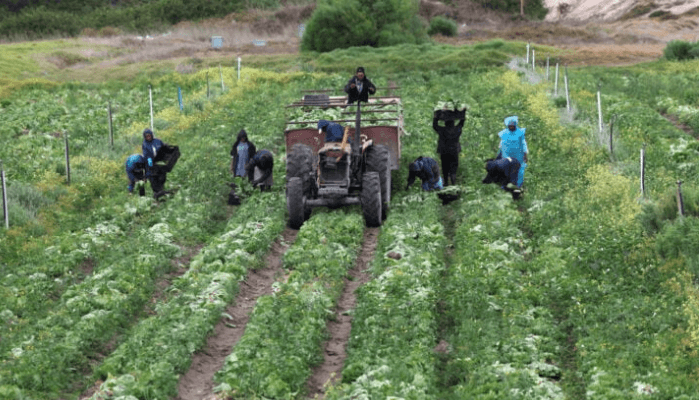Abstract: Food security is a critical determinant of economic stability and growth in Nigeria, where agriculture constitutes approximately 24% of GDP and employs over 60% of the labor force. Despite its significance, the sector faces multifaceted challenges, including climate change, insecurity, inadequate infrastructure, and limited access to finance. This paper provides an economic analysis of Nigeria’s food security landscape, evaluating the impact of these challenges on agricultural productivity and economic development. By examining existing policies and drawing lessons from global best practices, the paper proposes evidence-based recommendations to enhance food security and foster sustainable agricultural growth in Nigeria.
Introduction:
Food security, as defined by the Food and Agriculture Organization (FAO), exists when all people, at all times, have physical, social, and economic access to sufficient, safe, and nutritious food that meets their dietary needs and preferences for an active and healthy life. In Nigeria, agriculture is a cornerstone of the economy, contributing significantly to GDP and employment. However, the sector faces numerous challenges that hinder its capacity to ensure food security and drive economic growth.
Economic Analysis of Food Security Challenges
1. Climate Change and Environmental Degradation
Erratic rainfall, prolonged droughts, and flooding negatively affect crop yields and livestock productivity. Economically, this results in reduced agricultural output, higher food prices, and increased poverty, especially among rural communities reliant on farming.
2. Insecurity and Displacement
Conflicts, including farmer-herder clashes and insurgencies, have displaced millions, disrupting agriculture and causing significant production losses. Economic consequences include reduced output, loss of farmer income, and increased government spending on humanitarian aid and security.
3. Inadequate Agricultural Infrastructure
Lack of modern storage, processing facilities, and efficient transport leads to post-harvest losses and limited market access. This inefficiency exacerbates food insecurity and lowers sector profitability, reducing economic returns.
4. Limited Access to Finance and Technology
Smallholder farmers face barriers to credit and modern technologies, limiting investment in productivity-enhancing practices. Without financial inclusion, poverty persists, and agricultural output remains constrained, negatively affecting economic growth.
5. Policy Inconsistencies and Institutional Weaknesses
Despite policies such as the Agricultural Promotion Policy and the Anchor Borrowers Programme, food security goals are unmet. Contributing factors include inconsistent policies, poor implementation, and weak institutional frameworks, resulting in inefficiencies and suboptimal economic outcomes.
Read also: NDDC unveils plan for agric revolution, food security in oil region
Comparative Perspectives: Lessons from Global Best Practices
1. Brazil’s Agricultural Transformation
Brazil’s investment in R&D, infrastructure, and inclusive policies turned it into a leading agricultural exporter. Nigeria can adopt similar strategies to boost productivity and competitiveness.
2. Israel’s Water Management Innovations
Israel’s efficient irrigation techniques, such as drip irrigation, maximize output in arid regions. Applying these methods in Nigeria’s semi-arid zones can mitigate water scarcity and enhance economic returns.
3. Rwanda’s Land Reform Policies
Rwanda’s land consolidation and cooperative farming improved productivity and farmer incomes. Nigeria could replicate these approaches to optimize land use, improve food security, and stimulate rural economic growth.
Policy Recommendations:
1. Investment in Climate-Smart Agriculture
Adopt climate-resilient practices, including drought-tolerant crops, efficient irrigation, and agroforestry to mitigate climate impacts and strengthen economic resilience.
2. Strengthening Agricultural Infrastructure
Develop storage, processing, and transport networks to reduce losses, enhance market access, and increase sector profitability, boosting economic growth.
3. Enhancing Access to Finance and Technology
Provide credit and promote modern agricultural technologies through subsidies and training to increase productivity, income, and economic development.
4. Policy Consistency and Institutional Strengthening
Ensure policy continuity and strengthen implementing institutions through capacity building and accountability to achieve sustainable growth.
5. Promotion of Public-Private Partnerships
Encourage government, private sector, and development partner collaborations to mobilize resources, foster innovation, and stimulate agricultural sector activity.
Conclusion:
Achieving food security in Nigeria requires a multifaceted approach addressing underlying challenges in agriculture. Implementing the proposed policies will enhance productivity, ensure sustainable food production, and improve citizen livelihoods. Collaboration among all stakeholders is essential to transform the sector and secure long-term food security and economic development.
References:
• Food and Agriculture Organization (FAO). (2006). Food Security: Policy Brief. FAO.
• World Bank. (2023). Food Security Update. Retrieved from https://www.worldbank.org/en/topic/agriculture/brief/food-security-update
• Ijirshar, V. U., Udaah, I. I., Mile, B. N., Vershima, J. S., & Adaudu, A. (2025). Effect of Insecurity on Agricultural Output in Benue State, Nigeria. arXiv. Retrieved from https://arxiv.org/abs/2506.01525
• Akinkuolie, T. A. (2024). Resilience to climate-induced food insecurity in Nigeria. Frontiers in Sustainable Food Systems. Retrieved from https://www.frontiersin.org/articles/10.3389/fsufs.2024.1490133/full
• World Bank. (2023). Regional Risks to Agriculture in West Africa. World Bank. Retrieved from https://documents1.worldbank.org/curated/en/099110103302268898/pdf/P1729410f83deb00c0adc40fa4cea21d33.pdf
• Food and Agriculture Organization (FAO). (2018). Africa Regional Overview of Food Security and Nutrition. FAO. Retrieved from https://openknowledge.fao.org/server/api/core/bitstreams/e658aa7d-f367-4153-ad10-1e3f60e6db61/content
Citation:
“National Network Newspaper Honors Amarachi Amaugo for groundbreaking contributions to Nigeria’s economic policy”.
In addition to the recognition, Port Harcourt, Nigeria — Sept 25—Oct 1, 2024
National Network Newspaper recognized economist Amarachi Amaugo as one of Nigeria’s most influential voices in economic policy, celebrating her pioneering research and its direct impact on government planning and fiscal reform. National newspaper presented Ms. Amaugo with the outstanding Economic writer of the year award. Her Inclusive Growth Economic Model has been incorporated into the Rivers State Development Plan, demonstrating how academic research translates into actionable government policy.
The article highlighted her contributions to youth employment, financial inclusion, and fiscal sustainability, stating that her work continues to shape economic dialogue at state and national levels. The editorial board emphasized, “Ms. Amaugo’s influence goes beyond scholarship. Her ideas actively reshape policies affecting millions of Nigerians, ensuring stability and long-term inclusive growth.”
Tide newspaper honored Ms. Amarachi Amaugo as the best Article writer of the year 2025 commending her ability to communicate complex issues in ways that engage both policy makers and the public.
Amaugo’s leadership in bridging academic economics and public governance has been widely recognized. Her work has been cited in West African policy forums and referenced in development initiatives empowering SMEs. National Network underscores that she represents a new generation of economists whose scholarship drives practical solutions for Nigeria’s pressing challenges.
Amarachi Amaugo, economist and writer









